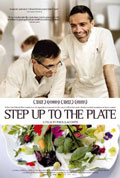
France 2012
Directed by
Paul Lacoste
86 minutes
Rated G
Reviewed by
Sharon Hurst

Step Up To The Plate
Synopsis: Michel Bras runs a Michelin 3-star restaurant in Laguiole, southern France. He has come to a critical time in his career, as he decides to hand the restaurant over to his son Sebastien, who has worked with him for 15 years. How will both men cope? This documentary takes us into the world of these two chefs, along with their family and its traditions.
I fell in love with this documentary from its opening close-up of a plate being carefully assembled, encompassing about 40 different leaves, veggie slices, flowers, fruits and more from the Aubrac region in southern France. It is called "Le Gargouillou" and is Michel Bras’ signature dish. In some ways it also symbolises what the film is about – food inspired by the seasons in a particular region of a country and created with love and memory of a life lived there with family and the traditions handed down within that family.
Step Up To The Plate is a film for foodies and those who enjoy the painstaking quality of the work that goes into creating innovative and magnificent food. It is even more so about the two men and their relationship to each other, to their work, and to their family's tradition. And of course for Michel it is about letting go, while for Sebastien it is the challenge of stepping into his father’s big shoes. In this respect anyone who enjoyed Jiro Dreams Of Sushi, which showed here earlier this year, will find this an interesting companion piece.
The camera employs extreme close-ups, of the food and of the men’s faces. We see Michel, determined to hand over his life’s work, but unable to easily extricate himself, often critical of Sebastien’s work and new creations. Sometimes they bicker good-naturedly – the love for their craft and each other is always evident. We see Sebastien trying to create his own signature dish using all sorts of ingredients from childhood memories, including the skin of milk, blackberries, chocolate, fried bread and more. The creation is more of an artistic outpouring than a dish. We accompany the men to the Japanese branch of their restaurant, and see Sebastien trying to create this special dish employing Japanese ingredients. Everything is performed with precision and utmost care, and the father’s tasting of the son’s creation carries unexpected filmic tension.
Unlike the recently released You Will Be My Son, in which there is extreme animosity between father and son over the handing on of the family business, this story is infused with much joy and languid enjoyment of nature and food. The many shots of sunrises and sunsets seem to carry much symbolic importance, just as the food itself is more than sustenance - it is the cement in this family. We see photos of Sebastien as a kid working with his father and Sebastien’s own children helping in the kitchen at home whilst grandma’s homemade blackberry jam slathered on thick bread with cheese, photographed in glorious close up, suggests a simplicity and earthiness that is as spiritually nourishing as it is delicious.

Want more about this film?


Want something different?




